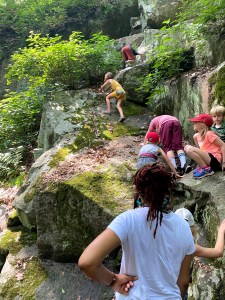Building Confident Campers
Summer was one of the most memorable times of childhood. As an environmental educator for Philadelphia Parks and Recreation, I have the privilege of supporting these lifetime memories with the children and families who attend our summer camps.
At the Wissahickon Environmental Center (Tree House) specifically, we focus our camp on youth-led experiences that allow for the whole child to grow based on their interest and abilities.
Camp is my favorite time for these experiences because we have them for at least a week, which enables them to build each day on the prior days’ successes.
One of the most recognizable points of growth in our campers is of their confidence through opportunities for risky play in nature.
We learned the depth of this pattern by asking the following questions at the end of the week:
What was your favorite part of the week?
What was your biggest challenge?
What are you most proud of?
The last two often correlate as they state they are most proud of overcoming their biggest challenge. This is where the true value of summer camp lies.
Although the Tree House has 100+ acres of nature surrounding it, nearby or neighborhood nature should never be overlooked. There is a wealth of nature and opportunities for risky play available at any playground. Have you ever witnessed the ants on spilled ice cream, butterflies on the ball field, or squirrels never far from picnic tables? How about climbing the backstop and seeing birds just as high, or digging in the extra mound of baseball sand and wondering where all the worms are? Asking questions like these is one way to help youth see that nature really is everywhere!
It is vital to a child's success for these experiences to be supported by a trusted adult, so for us, this means that we become “hummingbird” teachers. (Are you picturing yourself as a hummingbird? I always do.) Basically, we stand back and allow our campers to work out their challenges, only swooping in when it is absolutely necessary. Of course this does not mean that they go unsupported, but when they are given the tools and autonomy to choose how they will navigate their world, the outcome is increased confidence.
For example, before we climb rocks (or anything), I tell them to recognize what shoes they have on. What they may have been able to do on another day in a different pair of shoes on the same set of rocks does not matter at that moment. Nor does what they see others doing. I encourage them to do what they can do, with what they have, listen to their body, and act on what's best for them right then. When they are stuck, we demonstrate a few solutions, identify the risks, and they decide what’s best. Sometimes they move forward, and sometimes they return to flat ground with a plan to try again later. In either scenario, however, the camper never leaves the situation disappointed, which is key.
In addition to building confidence, allowing kids to engage in risky play like climbing also results in more learning! They connect with different rock formations and see plants and animals they may not have otherwise seen.
Injury is always a concern, and knock on wood, we have yet to have risky play injuries that needed more than a Band-Aid. We’ve needed to do more advanced first-aid for yellow jacket swarms, stinging nettle, and tick bites (all stories for another time), but the confidence risky play builds actually makes their play safer. We discuss First Aid at the beginning of camp which is another great example of how nature-based learning furthers independence.
Why all this talk about summer camp in January? Because that’s when camp planning begins. The thought of summer is never far from mind when programming in parks and recreation.
Regardless of your site or camp structure, there is an opportunity for us all to incorporate risky-play and other opportunities that build confidence, independence and empowerment, and now is the time to dream big.

Alexa, youth educator with Philadelphia Youth Network, supports campers as they climb an outcrop of Wissahickon Schist seen on their hike.

